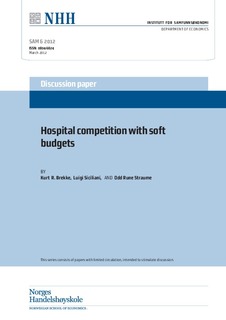| dc.contributor.author | Brekke, Kurt Richard | |
| dc.contributor.author | Siciliani, Luigi | |
| dc.contributor.author | Straume, Odd Rune | |
| dc.date.accessioned | 2012-10-18T10:48:56Z | |
| dc.date.available | 2012-10-18T10:48:56Z | |
| dc.date.issued | 2012-03 | |
| dc.identifier.issn | 0804-6824 | |
| dc.identifier.uri | http://hdl.handle.net/11250/163394 | |
| dc.description.abstract | We study the incentives for hospitals to provide quality and expend cost-reducing
effort when their budgets are soft, i.e., the payer may cover deficits or confiscate
surpluses. The basic set up is a Hotelling model with two hospitals that differ in
location and face demand uncertainty, where the hospitals run deficits (surpluses) in
the high (low) demand state. Softer budgets reduce cost efficiency, while the effect on
quality is ambiguous. For given cost efficiency, softer budgets increase quality since
parts of the expenditures may be covered by the payer. However, softer budgets reduce
cost-reducing effort and the profit margin, which in turn weakens quality incentives.
We also find that profit confiscation reduces quality and cost-reducing effort. First best
is achieved by a strict no-bailout and no-profit-confiscation policy when the regulated
price is optimally set. However, for suboptimal prices a more lenient bailout policy
can be welfare improving. | no_NO |
| dc.language.iso | eng | no_NO |
| dc.publisher | Norwegian School of Economics, Department of Economics | no_NO |
| dc.relation.ispartofseries | Discussion paper;6/2012 | |
| dc.subject | hospital competition | no_NO |
| dc.subject | soft budgets | no_NO |
| dc.subject | quality | no_NO |
| dc.subject | cost efficiency | no_NO |
| dc.title | Hospital competition with soft budgets | no_NO |
| dc.type | Working paper | no_NO |
| dc.subject.nsi | VDP::Social science: 200::Economics: 210::Economics: 212 | no_NO |
